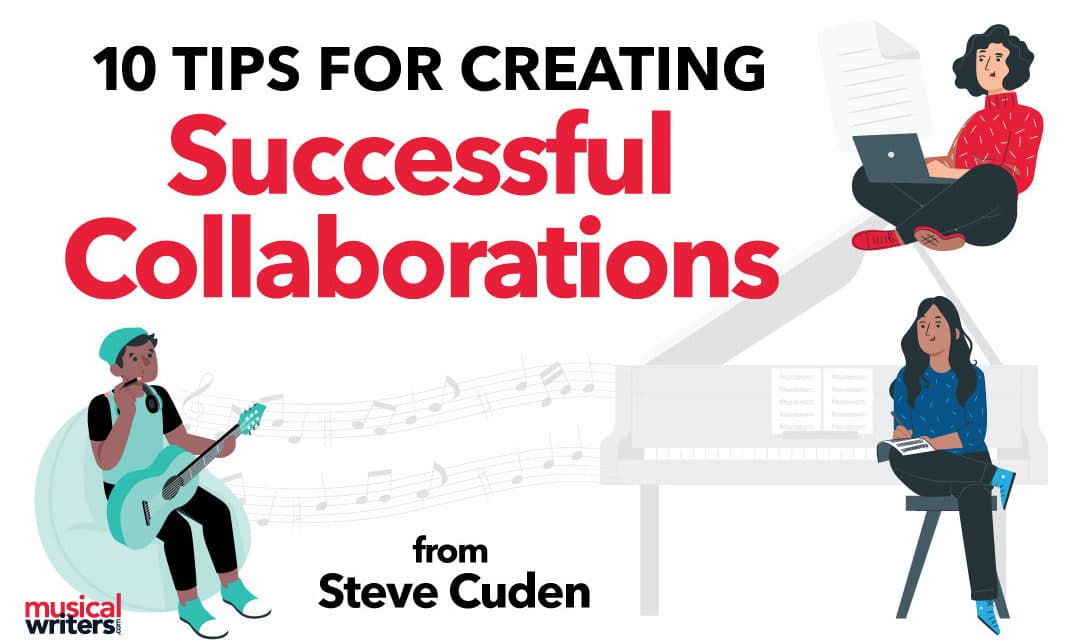Have someone in mind that you’d like a potential collaboration partnership with? A collaboration is like a marriage, and the musical is like a child. Don’t enter that relationship lightly.
Steve Cuden, co-creator of the musical Jekyll and Hyde and author of Beating Broadway shares tips on successful collaborations.
1. Have clearly defined responsibilities.
Collaborations are a kind of marriage. You may actually wind up spending more time around your collaborator than your significant other. These are, hopefully, long term relationships, and they must be treated similarly to being married. Where are the boundaries? Who does what? What parts of the relationship are truly shared and what parts are intended to be the domain of one partner or the other? This may be obvious – and not so much. Does the composer contribute to the libretto? Does the librettist influence the music? The short answer to both is, “Yes.” But you should each clearly know where your responsibilities lie on every project.
2. Like each other – at least a little!
It is useful that you get along as humans. To dislike working with one another will only lead to more anxiety than is justified. In other words, it’s a good idea that you like one another enough to hang out together for long periods.
3. Have somewhat similar tastes.
It’s useful if you are great friends. But it is not essential that you be great friends. What you must be is respectful, considerate, understanding, and both bring to the table similar amounts of work that you can mainly agree on. That means it is useful that you agree when you like something and agree when you don’t. Numerous successful collaborations have a standard unwritten rule: when either partner truly does not like something, it gets cut – no matter what the other one thinks or feels. In short, you must both be on the same page about the finished work.
4. Have a mutual respect for each other.
No domination of one partner over another. That’s the kiss of death. It’s a collaboration – not and employer/employee relationship.
5. Leave your emotions at the door.
It’s a business relationship, not an emotional one. For a successful collaboration, be a professional. Or at least act like one.
6. Give each other room to experiment, and learn to compromise.
Let the other partner experiment, play, try things out, and seek new results. Give your collaborator the freedom to explore.
Like in a successful marriage, successful collaborations will require compromise on a regular basis. If one party dominates the other, it may not work out so well by the time you have been at it long enough to achieve success. The art of compromise is a learnable skill set. Learn it. Learn to bend but not break.
8. Find a collaborator whose skills complement yours.
It is exceptionally important that writing partners complement one another. This means in terms of taste, skill sets, and ability. It is ideal when each partner brings to the table talents and experience that supports, expands, and completes what the other partner lacks. Perfect partnerships evolve when each partner’s strengths make up for the weaknesses of the other. Two (or more) partners who have similar talents and skills may prove to be ultimately unproductive because they will have similar weaknesses.
9. Be sure you establish a contract up front.
Like a marriage, there can be a kind of license toward sealing the deal. This is called a contract. You ought to have one. It makes things legally binding. It also defines what the relationship comprises – and who gets what should there be the misfortune of a divorce. This is certainly true in terms of money and credits. In my humble opinion, if one party objects to having a contract, that may rightly be perceived as a red flag. A contract only becomes truly useful under duress. To not have a contract at such a stressful time can result in a wide variety of sticky and difficult legal problems – none of which you ever want to experience. As good fences make for good neighbors, so do solid contracts make for good partnerships. There are, of course, various examples that counter this point of view, partners of highly successful partnerships with oral agreements or a handshake only. Good on them. But those are mostly outliers. If you are truly serious about working together over a long period of time, I highly urge you talk about, and have prepared, a contract for signature.
Having a contract in place also makes things easier when money starts coming in. Money changes everything. All business relationships undergo changes when real money comes into play. To resolve this, construct a legitimate contract, and be specific about financial details. Talk about this. Don’t avoid it. Assume nothing. Get your money relationship in order well prior to your earning any.
10. Commit to taking the mountains and the valleys together.
Be there for one another during both the highs and lows of your shared working experience. Enjoy the process. If it ain’t fun to work together, why do it?
Did you know our Ultimate Musical Writer’s Planner has a section on finding and creating successful collaborations? Check it out here!
For more articles on MusicalWriters.com by Steve Cuden, click here. Also check out “StoryBeat,” his podcast for storytellers and creatives at StoryBeat.net.


















